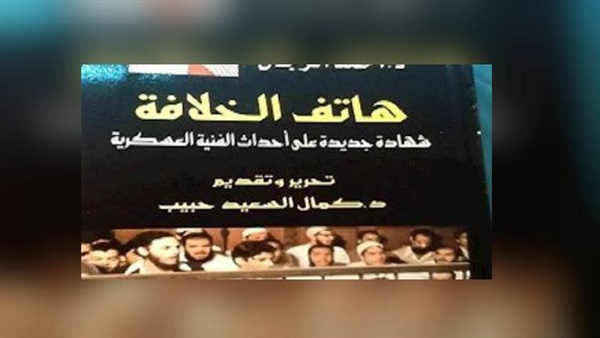«The Caliphate Call».. A case of awakening at the moment of killing

He found himself in a strange and
enviable position, where he is required to submit to commit a heinous act for
an alleged purpose.
And has been in his mind many of the
rumors that focused on the reasons for the implementation of this matter.
He tried to execute but his soul did not
obey him, so he decided to flee and report what he intended to do, and the full
details of the massacre that will take place. But none believed him, rather he
was ridiculed for what he said and he was put in prison. Until the news of the
operation was repeated, then he was deported to the State Security headquarters
to know the dimensions of the case.
Ahmed al-Regal, an Egyptian doctor, born
in 1953 in the province of Beheira, and one of the participants in the
terrorist incident known as the "Military Art" incident, which
occurred 44 years ago, on April 18, 1974.
When members of an organization called
"Military Art" under the leadership of Salih Sariya tried to storm
the building of the Faculty of Military Art in Egypt to seize arms to be used
to carry out an attempted coup against the rule of the late President Anwar
Sadat. Believing that they are on track to achieve their dream of establishing
the so-called "Caliphate State".
After many years of the massacre, which
killed 13 people, the "El-Regal" came out of his silence and
testified after he was over 60. To describe accurately the moment of his
committing the massacre, in his book «Caliphate call: A new testimony to the
events of military art», edited by Dr. Kamal Habib, an academic specialist in
Islamic movements, who witnessed this period from his previous position as a
member of The so-called «Jihad organization».
«Caliphate
Call» an invitation to meet the call:
"Men"
used the term "Caliphate Call" to be the title of what he experienced
in an organization living on the dream of restoring the Caliphate, when he was
a student at the Faculty of Medicine at the University of Alexandria.
Therefore, Habib presented some
indicators that help to use the term "Call" to understand the motives
of young people who offer their lives without a price for deceitful illusions.
Such as: The Call: in fact is a psychological act of a collective nature
calling in the human factors of courage regain what he lost, and then raise his
concern and push him to move without a plan, without questioning the future and
without searching for the hows, but it pushes the soul to its fate even if it
is going to die".
"These young people rushed behind
the call to cheer themselves and their passion and their innocent souls. As a
shadow inherent to the image of the human when he moves, but we are in front of
a spiritual shadow addresses the spirit and flirting ideas and exhorting them
to rise to restore the Caliphate,» the editor of the book added.
In the book introduction, Habib
explains: "The author lived with his calls, which his friends adorned
him." He pointed out that "Islamic calls" are the ones that
decorate the way for them in their beginning, and then when they take steps
forward they remain dominant.
The
dream of establishing the Caliphate:
Al-Regal had a vision that the dream of
Caliphate would return through this organization, without knowing that these
organizations are only a trap to enter into an unbalanced confrontation with
the state as a result of committing acts of heinous impact.
So he said in his book: "I felt
that the dawn of the Islamic caliphate was imminent, which made me do more
intensive physical exercises neglecting my medical study, prepared
psychologically and physically for the day that overlooks the dawn that we have
long waited for»
Psychological Impact:
The main idea of the
book "The Caliphate Call: A New
Testimony on Military Art Events" revolves around key aspects of
psychological influence, including how al-Regal join the "military
art" organization.
Where he explained that after he had
addressed a speech in the mosque of the university hospital, on the need to
resort to the «law of God», and then explain the meaning of «Jihad», three
members of the organization offered him to join an existing organization aims
to establish an Islamic state by force.
Al-Regal said that when he saw the drawings of the People's Assembly from
inside, he felt that the dream of taking power and establishing the Caliphate
was imminent.
Then
al-Regal was shocked when he found himself demanded to implement the first
phase of the operation. Which is based on the slaughter of a guard of the
college gates, to break into the college and steal weapons to be used in the
implementation of a military coup resulting in the declaration of Caliphate.
When al-Regal found himself in front of
the slaughter, he decided to retreat and he informed the authorities hours
before the incident. But it was delayed until the massacre took place, the plan
failed and the case ended with the execution of three defendants, including the
leader of the organization, Salih Sariya.
It is noteworthy that the late leader
Talal al-Ansari, one of the most important members of the military art
organization, was the first to come out of his silence, but the difference is
that al-Ansari spoke in his book about organization historically, while
al-Regal talked about and himself and his feelings.
So he decided to release his appeal,
hoping that it would be a warning to prevent the young people from falling into
the violent vortex. Those who are pushing for Daesh and similar organisations,
hoping that it may waking them up from their illusions.







